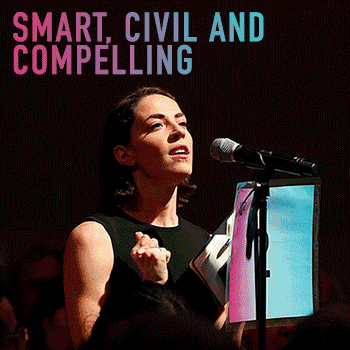How to build good technology
How to build good technology
WATCHBusiness + LeadershipClimate + EnvironmentScience + Technology
BY Matthew Beard 2 MAY 2019
Dr Matthew Beard explains the key principles to guide the development of ethical technology at the Atlassian 2019 conference in Las Vegas.
Find out why technology designers have a moral responsibility to design ethically, the unintended ethical consequences of designs such as Pokemon Go, and the the seven guiding principles designers need to consider when building new technology.
Whether editing a genome, building a driverless car or writing a social media algorithm, Dr Beard says these principles offer the guidance and tools to do so ethically.
Download ‘Ethical By Design: Principles For Good Technology ‘
Ethics in your inbox.
Get the latest inspiration, intelligence, events & more.
By signing up you agree to our privacy policy
You might be interested in…
Opinion + Analysis
Business + Leadership, Politics + Human Rights, Relationships
It’s time to increase racial literacy within our organisations
Opinion + Analysis
Science + Technology, Business + Leadership, Society + Culture
AI might pose a risk to humanity, but it could also transform it
Opinion + Analysis
Business + Leadership
The anti-diversity brigade is ruled by fear
Opinion + Analysis
Business + Leadership, Society + Culture
The Ethics Centre: A look back on the highlights of 2018
BY Matthew Beard
Matt is a moral philosopher with a background in applied and military ethics. In 2016, Matt won the Australasian Association of Philosophy prize for media engagement. Formerly a fellow at The Ethics Centre, Matt is currently host on ABC’s Short & Curly podcast and the Vincent Fairfax Fellowship Program Director.
The dangers of being overworked and stressed out

The dangers of being overworked and stressed out
Opinion + AnalysisBusiness + Leadership
BY Fiona Smith 1 MAY 2019
If anyone has a visceral understanding of how high-pressure work environments make mincemeat from young graduates, it is Georgie Dent. Her first job as a young lawyer ended in a nervous breakdown and two weeks in a psychiatric hospital.
Now a well-known journalist and advocate for women, Dent is also supporting her husband (a surgeon-in-training) through the brutal demands of his work, is raising three young daughters and has just published a book (Breaking Badly) about how things fell apart during her 18-months of working in a top law firm, 12 years ago.
“I think that there is the same sort of cultural expectation in law and medicine, that you will suck up absolutely everything and you will work around the clock,” she says.
When Dent looks back at her time as a lawyer, she acknowledges that an unworkable workplace was just one element in her breakdown. She also had to deal with her anxious personality and the ravages of Crohn’s Disease – a life-long gastrointestinal disorder.
“I think, for me, it probably wasn’t avoidable. I actually think, no matter what job I had taken, I was headed for some sort of breakdown. Being in a particularly stressful job with really long hours certainly didn’t help me physically… and then mentally,” she says.
Dent’s first six-month rotation in the law firm was with a Partner who was regarded as a genius and “rainmaker”, but was actually a shouting bully. As she details in her book:
“Almost anyone who has done any work inside a large law firm will have a tale or two about a tyrannical partner. These men and women are feared and revered in equal measure: they are not afraid of throwing phones and think nothing of publicly dressing down members of their team, they expect an immediate response to every email regardless of the time it’s dispatched, and generally have everyone in their vicinity living on a knife’s edge.
“The man I worked for had had nine members of staff leave in the six months before I joined – and it was a team of six. He went hot and cold, and was aggressive, void of self-awareness and really difficult to please.”
A lack of autonomy
Dent stayed the course and then moved onto a team that was welcoming and collegiate, but the stress had exacerbated her Crohn’s, which only added to her anxiety.
Juniors such as Dent, as she was then, had been the stars of their schools and universities, but found their achievements and intellect counted for little at work.
“As the firm’s underlings, we operated at the whims of partners, senior lawyers and clients. The higher a person climbs in a law firm the greater autonomy they secure. We were on the bottom rung, which meant no autonomy at all.
“We were so lowly, in fact, that we were rarely given a glimpse of the ‘big picture’. Instead, we were often asked to complete tasks without any context, which meant we were regularly blindsided when it came to the next step.
“Having a substantive task doled out at 5.30pm with a tight turnaround wasn’t unusual – in fact, it was practically expected. The salt in the wound was when this kind of task was handed to you at the end of a quiet day, after you had been hanging around and asking for work since morning, unsure of how you could possibly meet your billable target without anything to do.”
Dent sees this lack of control as a factor in burn-outs among lawyers and doctors.
Unsafe hours for doctors
Reconstructive plastic surgeon, Neela Janakiramanan, has written about the pressures on young doctors in a column for Women’s Agenda(of which Dent is a contributing editor).
“As an intern, I learned that it is considered acceptable to work eighty hours in a week if you have the following week off, and not be paid overtime for the week worked because the average across the fortnight is only forty,” writes Janakiramana.
Janakiramana’s longest fortnight was 204 hours in twelve consecutive days, “with the majority of it on call, in the midst of a job where the average was 180 hours a fortnight. I was in my third trimester of pregnancy”.
It is worth noting that the suicide rate for doctors is twice that of the general population and a 2016 audit found 53 per cent of public hospital doctors are working unsafe hours. Mental health starts to decline after someone has worked more than 39 hours per week, according to research.
After leaving the law firm to recuperate, Dent found herself in another occupation often regarded as high-pressure – journalism – for BRW magazine. Even though she was again starting at the bottom, Dent found the experience enlightening.
“It was just so different to me, culturally,” she says.
“In editorial meetings, people were allowed to speak. In a law firm… you don’t speak unless you’re spoken to. As a junior, you’re not even allowed to send an email.
“[In law firms] You’re on the leash so much and, culturally, that creates a different dynamic. I found it very refreshing to walk into other workplaces where you can still sit around the table and pitch ideas and contribute to conversations without thinking through every single word that you say.”
Longer (hours) does not equate to ‘better’
When it comes to working hours, many studies show that longer work weeks do not improve productivity. They may even make people less productive.
Dent points to the experience of Perpetual Guardian in New Zealand, which offered its 250 staff a four-day work week, while retaining their full-time wages. A study of the impact of the initiative reported lower stress levels, higher levels of job satisfaction and an improved sense of work-life balance.
Company founder, Andrew Barnes, told The Guardian: “For us, this is about our company getting improved productivity from greater workplace efficiencies… there’s no downside for us”.
Dent supports the idea that law firms “gear themselves” around efficiency, rather than time worked.
“I think then across every industry, every field, I think we need to get a recognition that we work incredibly long hours and we have to look at how that is impacting our lives as well as that work,” she says.
“It’s easy to fall into that trap of thinking that, in this line of work [law], we have to be available all the time and that’s the only way we can deliver value to clients. I just don’t necessarily think that’s true. And I think that it’s worth being a little bit bold.”

This article was originally written for The Ethics Alliance. Find out more about this corporate membership program. Already a member? Log in to the membership portal for more content and tools here.
Ethics in your inbox.
Get the latest inspiration, intelligence, events & more.
By signing up you agree to our privacy policy
You might be interested in…
Opinion + Analysis
Business + Leadership
How avoiding shadow values can help change your organisational culture
Opinion + Analysis
Business + Leadership, Science + Technology
Big tech knows too much about us. Here’s why Australia is in the perfect position to change that
Opinion + Analysis
Business + Leadership, Health + Wellbeing, Relationships
Office flings and firings
Opinion + Analysis
Business + Leadership, Relationships
Unconscious bias: we’re blind to our own prejudice
BY Fiona Smith
Fiona Smith is a freelance journalist who writes about people, workplaces and social equity. Follow her on Twitter @fionaatwork
Overcoming corruption in Papua New Guinea

Overcoming corruption in Papua New Guinea
Opinion + AnalysisBusiness + LeadershipClimate + EnvironmentSociety + Culture
BY David Burfoot 30 APR 2019
Papua New Guinea is known as one of the most corrupt countries in the world.
Yet through delivering ethical leadership training to public officials there, The Ethics Centre is seeing a natural aptitude for ethics that government and corporations are struggling to nurture in Australia.
It has one of the most diverse cultures with over 850 known languages spoken. It is rich in minerals, gas and forestry.
Yet despite its natural wealth, Papua New Guinea suffers the ‘paradox of plenty’ or ‘resource curse’. This is where countries endowed with rich natural resources struggle to make effective use of them and end up with lower levels of economic development than countries without those natural resources. How could this be?
PNG is plagued by what the United Nations Development Program claim to be the most crippling ethical failure in international development: corruption.
Transparency International ranks PNG as one of the most corrupt countries in the world. Its PNG chapter states, “There is massive disrespect for rule of law in Papua New Guinea. Public servants and citizens alike lack the integrity to adhere to proper processes and respectful ways of conduct”.
Such assessments may however overlook some important strengths amongst PNG’s people, ones which may in time prove instrumental in corruption control.
The Ethics Centre delivers a broad range of ethics educational programs, including one package being delivering to senior PNG Officials, funded by Department of Foreign Affairs and Trade.
Contrary to what some might guess, this training does not lecture participants about what is ‘right’ and ‘wrong’. Instead, it identifies what is meant by ‘ethics’, what gets in the way of ethical decision making and mechanisms to integrate ethics into the governance of organisations and their various activities.
More research is showing the power of ethical leadership in building strong organisational cultures that are able to resist ethical failure (like corruption) and enhance corporate performance.
The program links personal and organisational ethical frameworks. Different factors are identified as influential to the ‘PNG mindset’ and decision making of public officials:
- Christian values
- Clan values
- Government values
- Global values
At times the training also includes instruction on specific techniques, such as conflicts of interest management and probity reviewing.
Instruction in these skills is growing in demand in Australia and abroad as government and corporations alike search for ways of winning back public trust and confidence.
In contrast to the past problematic approach of corporate leaders to ethics in the West, that is, as non-essential and nice-to-have, PNG officials demonstrated a sophisticated appreciation of the instrumental and social value of ethics in administration.
As facilitators, we learnt much about the ethical dilemmas and challenges confronting PNG officials, often on a scale many Australians would have difficulty comprehending. A person’s relationship with a clan, family, profession and government at times present complex dilemmas.
Yet these officials’ enthusiasm for honouring all these duties and appreciating their tangible and intangible worth appears undiminished. They appear to have missed the economic rationalist memo. And this is a real strength for PNG, something some commentators may be overlooking.
To help preserve this strength and to take advantage of it in countering corruption and other PNG challenges, The Ethics Centre is talking to potential partners about co-designing content with local officials and developing a train-the-trainer program.
We know local officials are enthusiastic for more of this training, indeed, it was the PNG Department of Personnel Management who requested education in ethical decision making for public servants. The average Net Promotor Score from participants on the program is 88 (of a score between -100 and +100), indicating high levels of satisfaction. We look forward to continuing our work with the Australian Government and the Government and people of PNG on this important initiative.
Lead photo by Stefan Krasowski
Ethics in your inbox.
Get the latest inspiration, intelligence, events & more.
By signing up you agree to our privacy policy
You might be interested in…
Opinion + Analysis
Business + Leadership
The value of principle over prescription
Opinion + Analysis
Society + Culture
Sex ed: 12 books, shows and podcasts to strengthen your sexual ethics
Opinion + Analysis
Business + Leadership
Perils of an unforgiving workplace
Opinion + Analysis
Business + Leadership, Politics + Human Rights
Do diversity initiatives undermine merit?
BY David Burfoot
David has worked in the not-for-profit, public and private sectors domestically and internationally for organisations as diverse as the United Nations Development Program, Deloitte, the NSW Independent Commission Against Corruption and Sydney University. He has been an anti-corruption specialist with a number of government agencies and held senior positions responsible for corporate planning, change and internal communications.
Ethical concerns in sport: How to solve the crisis

Ethical concerns in sport: How to solve the crisis
Opinion + AnalysisBusiness + LeadershipHealth + WellbeingSociety + Culture
BY David Burfoot 28 APR 2019
The Ethics Centre (TEC) has often been called upon to assist sporting organisations with ethical crisis.
The Ethics Centre recently took advantage of an opportunity to discuss two recent cases regarding ethical sport dilemmas with a group of HR Sport Executives. It was an enlightening experience and we’d like to share it with you.
As a reminder, TEC undertook two high-profile reviews of sporting organisations over the last 18 months, the Australian Olympic Committee (AOC) and Cricket Australia (CA).
The first of these explored the comparison between sportsmanship and the ‘pragmatic’ or even gamesmanship* approach to its administration. Bringing the two approaches was problematic and culminated in disenchantment, frustration and an organisational culture that neither represented the best of sport or organisational administration.
The Centre delivered a warts-and-all report with 17 recommendations, all of which were accepted. Recent discussions with AOC reveal a major shift in the culture of the organisation over the last 12 months, under the leadership of CEO Matt Carroll and the Head of People and Culture, Amie Wallis. AOC staff need to be congratulated for what they have achieved.
The other engagement was with Cricket Australia, a culture and governance review in response to the ball-tampering incident at the Newlands Ground in South Africa during an international test match in March 2018. It was clearly against the rules.
The initial attempts of the players to conceal what they were doing is testament to this. But it wasn’t as clean-cut as that. The incident seemed to represent an attack on something sacred to Australians. Many fans reacted as if they were personally afflicted.
Our interviews and surveys of CA staff, players, cricket officials, sponsors and members of the public often explored the difference between sportsmanship and gamesmanship. Comparisons were drawn between ball-tampering, sledging and the underarm bowling incident in 1981 during a One Day International cricket match between Australia and New Zealand.
We recently had the good fortunate of being invited to a discussion about such issues with a group of HR executives, representing some of the major professional sporting organisations in Australia, from Horse Racing to Rugby, organised by Mercer Australia.
And of course we accepted.
We put to them the observation that when there is fraud in government, the actions are often labelled corruption, as they signify a greater social betrayal than a breach of the law. Fraud in the private sector doesn’t attract the same moral outrage and avoids the ‘corruption’ label, with one exception: sport. Sport also uses the word ‘corruption’ to describe fraudulent behaviour. We asked why.
The group started with the suggestion that people take sport personally, as we all feel part of it and we all feel like we own it. We play it to pursue the best in us, we barrack for our team, we involve our children in it and we use it as a tool to teach our children about values, about what is important in life.
We all feel obliged to have an opinion about it, perhaps as Australians. This is probably why people feel fraud in sport is a moral issue that goes beyond compliance with the law, a social ‘evil’ that the word ‘corruption’ better conveys. There was also the feeling that corruption is used because it reveals the interconnected network that comes with fraud in sport.
When asked about the dilemmas in sport more broadly, many spoke about the challenge players experience balancing their need to win and earn income, with their long-term wellbeing.
Players often hide their injuries to avoid being dropped from teams. These injuries are often physical, but sometimes they are mental. The period where an athlete is most successful financially is narrow. The pressure to sacrifice their long-term health as a result is real.
As HR professionals they also spoke of their dilemmas, when they need to balance advocacy for the individual player with the best interests of the company or business side of the sport. They spoke of this also in relation to the management of the team, when the coach feels the need to let someone play because their family is present, even though it may not be in the best interest of a win.
They spoke about how officials are tempted to overlook bad leadership of team leaders when the characters themselves raise the winning morale of the team. Some spoke about the challenges of being considerate of a person’s background, but also being clear that it did not excuse bad behaviour such as sexual harassment.
We see related dilemmas in other sectors currently under the public spotlight. It is accepted that the unique relationship between sport and ethics has been neglected by philosophers.
There may be much to be learnt by our experience of sport, and how its values are brought to the wider theatre of life. These discussions help us reach a better understanding about these relationships.
* Gamesmanship is built on the principle that winning is everything. Athletes and coaches are encouraged to bend the rules wherever possible in order to gain a competitive advantage over an opponent.
Ethics in your inbox.
Get the latest inspiration, intelligence, events & more.
By signing up you agree to our privacy policy
You might be interested in…
Opinion + Analysis
Health + Wellbeing
Your kid’s favourite ethics podcast drops a new season to start 2021 right
Opinion + Analysis
Health + Wellbeing, Relationships, Science + Technology
Hallucinations that help: Psychedelics, psychiatry, and freedom from the self
Big thinker
Relationships, Society + Culture
9 LGBTQIA+ big thinkers you should know about
Opinion + Analysis
Business + Leadership
Tim Walker on finding the right leader
BY David Burfoot
David has worked in the not-for-profit, public and private sectors domestically and internationally for organisations as diverse as the United Nations Development Program, Deloitte, the NSW Independent Commission Against Corruption and Sydney University. He has been an anti-corruption specialist with a number of government agencies and held senior positions responsible for corporate planning, change and internal communications.
How can Financial Advisers rebuild trust?

How can Financial Advisers rebuild trust?
Opinion + AnalysisBusiness + Leadership
BY The Ethics Centre 12 APR 2019
It would be no exaggeration to say the Australian financial advice industry is going through a difficult time.
Following years of scandals, and shocking evidence brought to light by the Hayne royal commission, urgent steps are now being taken to “professionalise” the banking and finance sector.
Amongst the headlines: embattled financial services giant AMP is setting aside an eye watering $290 million to compensate customers who received poor financial advice, and a further $35 million annually to improve compliance structures.
All of the major banks have announced their plans to “amputate” financial advice and wealth management from their portfolio of vertically integrated activities.
Many advisers have already lost their jobs. And many more have already announced their intention to leave the industry rather than face greater scrutiny and a new compliance burden.
For those operators planning to stay in business, there’s a new sheriff in town. The Financial Adviser Standards and Ethics Authority (FASEA) was established by the Federal Government in 2017 to set the education, training and ethical standards of licensed financial advisers in Australia.
FASEA requirements for mandatory education and Continuous Professional Development (CPD) are unlike anything the industry has ever seen.
The push to professionalise the sector is moving with speed. Starting this year, advisers will be required to undertake formal education, in the form of either a full degree or bridging course, plus nine hours of continuing professional development (CDP) annually. Advisers will be required to pass an exam to earn their license and continue to operate.
What’s the problem?
While the standards mentioned above might sound perfectly reasonable to someone already working within a well established profession such as accountancy or the law, this is unfamiliar territory for many financial advisers.
Many advisers who have been working for years or even decades will be daunted by the demand for serious study and a formal academic qualification. Some advisers have already expressed concern at the financial burden of course fees and lost income. Many others will be daunted by the sheer number of hours required each year to meet FASEA’s standards.
It’s little wonder the industry is going through a crisis of confidence. And while the emphasis has rightly been placed on the rights of the customer, and the many people who have received poor advice, it’s also worth pausing to think about the impact this has on individual advisers – some of whom have been operating honestly and ethically for many years. For such people, and there are many, the avalanche of bad press and community outcry has been difficult to bear.
We know many people become financial advisers because they are passionate about the financial wellbeing of their family, friends and community. They aspire to help people secure economic stability and security whilst avoiding the abundant pitfalls and bad products.
Of Gallup’s Five Essential Elements of Well-being, financial security is at the centre. Practiced ethically and professionally, the work of a financial adviser supports and protects other critical areas of a person’s life.
This leads to some interesting questions about the overarching purpose of a financial adviser.
Why does this role exist? What purpose does it serve individuals, communities and society at large? What is the overarching public good that can be achieved from a profession that supports, protects and grows a person’s financial wealth?
Or to look at it another way, what would the world look like without financial advice? If all of the competent advisers were to leave the industry, where does that leave the community?
Advisers who are on the fence about their future should take time to work out what the role of financial advice means to them. Whilst the reputation of the industry may be at its lowest point, it’s a great time to get back to basics and think about the purpose and impact of this type of work.
What is the solution?
The Ethics Centre has had quite a bit of involvement in this story as it’s unfolded. When the scandal first began to erupt three years ago, we worked with some of the largest advice firms to develop in-house training programs for financial advisers.
We’ve helped inform FASEA’s thinking on ethical standards for the industry. We’re currently working on building a course on ethics and professionalism to be delivered by universities.
We also offer free counselling to individuals via our Ethi-call service – and that includes financial advisers struggling at a career crossroads.
For those advisers currently at this point, we’d advise some clear headed thinking about career purpose and priorities. If you think you’d benefit from talking through your dilemma with an impartial counsellor, you are welcome to call Ethi-call.
The service is a free, appointment-based telephone counselling service offered by The Ethics Centre to help people navigate some of life’s toughest decisions.
Ethics in your inbox.
Get the latest inspiration, intelligence, events & more.
By signing up you agree to our privacy policy
You might be interested in…
Opinion + Analysis
Business + Leadership
Getting the job done is not nearly enough
Opinion + Analysis
Business + Leadership, Health + Wellbeing, Society + Culture
Ethical concerns in sport: How to solve the crisis
Opinion + Analysis
Business + Leadership
Day trading is (nearly) always gambling
Opinion + Analysis
Business + Leadership
How to improve your organisation’s ethical decision-making
BY The Ethics Centre
The Ethics Centre is a not-for-profit organisation developing innovative programs, services and experiences, designed to bring ethics to the centre of professional and personal life.
Is technology destroying your workplace culture?

Is technology destroying your workplace culture?
Opinion + AnalysisBusiness + LeadershipScience + Technology
BY Matthew Beard 6 APR 2019
If you were to put together a list of all the buzzwords and hot topics in business today, you’d be hard pressed to leave off culture, innovation or disruption.
They might even be the top three. In an environment of constant technological change, we’re continuously promised a new edge. We can have sleeker service, faster communication or better teamwork.
This all makes sense. Technology is the future of work. Whether it’s remote work, agile work flows or AI enhanced research, we’re going to be able to do more with less, and do it better.
For organisations who are doing good work, that’s great. And if those organisations are working for the good of society (as they should), that’s great for us all.
Without looking a gift horse in the mouth though, we should be careful technology enhances our work rather than distracting us from it.
Most of us can probably think of a time when our office suddenly had to work with a totally new, totally pointless bit of software. Out of nowhere, you’ve got a new chatbot, all your info has been moved to ‘the cloud’ or customer emails are now automated.
This is usually the result of what the comedian Eddie Izzard calls “techno-joy”. It’s the unthinking optimism that technology is a cure for all woes.
Unfortunately, it’s not. Techno-joyful managers are more headache than helper. But more than that, they can also put your culture – or worse, your ethics – in a tricky spot.
Here’s the thing about technology. It’s more than hardware or code. Technology carries a set of values with it. This happens in a few ways.
Techno-logic
All technology works through a worldview we call ‘techno-logic’. Basically, technology aims to help us control things by making the world more efficient and effective. As we explained in our recent publication, Ethical by Design:
Techno-logic sees the world as though it is something we can shape, control, measure, store and ultimately use. According to this view, techno-logic is the ‘logic of control’. No matter the question, techno-logic has one overriding concern: how can we measure, alter, control or use this to serve our goals?
Whenever you’re engaging with technology, you’re being invited and encouraged to see the world in a really narrow way. That can be useful – problem solving happens by ignoring what doesn’t matter and focussing on what’s important. But it can also mean we ignore stuff that matters more than just getting the job done as fast or effectively as we can.
A great example of this comes from Up in the Air, a film in which Ryan Bingham (George Clooney) works for a company who specialise in sacking people. When there are mass layoffs to be made, Bingham is there. Until technology comes to call. Research suggests video conferencing would be cheaper and more effective. Why fly people around America when you can sack someone from the comfort of your own office?
As Bingham points out, you do it because sometimes making something efficient destroys it. Imagine going on an efficient date or keeping every conversation as efficient as possible. We’d lose something essential, something rich and human.
With so much technology available to help with recruitment, performance management and customer relations, we need to be mindful that technology is fit for purpose. It’s very easy for us to be sucked into the logic of technology until suddenly, it’s not serving us, we’re serving it. Just look at journalism.
Drinking the affordance Kool-Aid
Journalism has always evolved alongside media. From newspaper to radio, podcasting and online, it’s a (sometimes) great example of an industry adapting to technological change. But at times, it over adapts, and the technological cart starts to pull the journalistic horse.
Today, online articles are ‘optimised’ to drive engagement and audience. This means stories are designed to hit a sweet spot in word count to ensure people don’t tune out, they’re given titles that are likely to generate clicks and traffic, and the kinds of things people are likely to read tend to get more attention.
A lot of that is common sense, but when it turns out that what drives engagement is emotion and conflict, this can put journalists in a bind. Are they impartial reporters of truth, lacking an audience, or do they massage journalistic principles a little so they can get the most readers they can?
I’ll leave it to you to decide which way journalism as an industry has gone. What’s worth noting is that many working in media weren’t aware of some of these changes whilst they were happening. That’s partly because they’re so close to the day-to-day work, but it can also be explained by something called ‘affordance theory’.
Affordance theory suggests that technological design contains little prompts, suggesting to users how they should interact with it. They invite users to behave in certain ways and not others. For example, Facebook makes it easier for you to respond to an article with feelings than thinking. How? All you need to do to ‘like’ a post is click a button but typing out a thought requires work.
Worse, Facebook doesn’t require you to read an article at all before you respond. It encourages quick, emotional, instinctive reactions and discourages slow thinking (through features like automatic updates to feeds and infinite scroll).
These affordances are the water we swim in when we’re using technology. As users, we need to be aware of them, but we also need to be mindful of how they can affect purpose.
Technology isn’t just a tool, it’s loaded with values, invitations and ethical judgements. If organisations don’t know what kind of ethical judgements are in the tools they’re using, they shouldn’t be surprised when they end up building something they don’t like.
Ethics in your inbox.
Get the latest inspiration, intelligence, events & more.
By signing up you agree to our privacy policy
You might be interested in…
Opinion + Analysis
Business + Leadership
Activist CEO’s. Is it any of your business?
Opinion + Analysis
Science + Technology
The rise of Artificial Intelligence and its impact on our future
Opinion + Analysis
Business + Leadership, Health + Wellbeing, Relationships
Moving on from the pandemic means letting go
Opinion + Analysis
Business + Leadership, Society + Culture
A new guide for SME’s to connect with purpose
BY Matthew Beard
Matt is a moral philosopher with a background in applied and military ethics. In 2016, Matt won the Australasian Association of Philosophy prize for media engagement. Formerly a fellow at The Ethics Centre, Matt is currently host on ABC’s Short & Curly podcast and the Vincent Fairfax Fellowship Program Director.
Corruption in sport: From the playing field to the field of ethics

Corruption in sport: From the playing field to the field of ethics
Opinion + AnalysisBusiness + LeadershipHealth + WellbeingSociety + Culture
BY David Burfoot 22 MAR 2019
Play fair or play to win. The interests of an individual player versus the team. Bad leaders who get good results.
These are just some of the common ethical tensions occurring throughout elite Australian sport. And they lead to corruption.
The Ethics Centre undertook two high profile reviews of sporting organisations over the past 18 months, the Australian Olympic Committee (AOC) and Cricket Australia (CA).
Australian Olympic Committee
Our AOC review explored the comparison between sportsmanship and gamesmanship. Sportsmanship is the fair, honest and decent treatment of others in competition. Gamesmanship, on the other hand, is built on the principle that winning is everything. Athletes and coaches are encouraged to plot, ploy and bend the rules wherever possible in order to gain a competitive advantage over opponents.
Bridging the two approaches was problematic. It culminated in disenchantment, frustration and an organisational culture within AOC that neither represented the best of sport or organisational administration.
The Ethics Centre delivered a warts-and-all report with 17 recommendations, all of which were accepted.
Recent discussions with AOC reveal a major shift in the culture of the organisation over the last 12 months, under the leadership of CEO Matt Carroll and the head of people and culture, Amie Wallis. AOC staff need to be congratulated for their achievements.
Ball tampering and Cricket Australia
The other engagement was with Cricket Australia – a culture and governance review in response to the ball tampering incident in South Africa in March 2018, something that was clearly against the rules.
Initial attempts by players to conceal what they were doing was testament to this, but it wasn’t as clean cut as that. The incident seemed to represent an attack on something sacred to Australians. Many fans reacted as if they were personally afflicted.
Our subsequent interviews and surveys with CA staff, players, officials, sponsors and members of the public often explored the difference between sportsmanship and gamesmanship.
Comparisons were drawn between ball tampering, sledging and the underarm bowling incident in 1981 during a One Day International cricket match between Australia and New Zealand.
Sporting HR executives
We recently had the good fortunate of being invited to a discussion about such issues with a group of HR executives, representing some of the major professional sporting organisations in Australia, from Horse Racing to Rugby, organised by Mercer Australia.
We put to them the observation that when there is fraud in government, the actions are often labelled corruption, as they signify a greater social betrayal than a breach of the law. Fraud in the private sector doesn’t attract the same moral outrage and avoids the label of corruption. But there is one exception. Sport also uses the word corruption to describe fraudulent behaviour. We asked why.
The group started with the suggestion people take sport personally, as we all feel part of it and like we own it. We play it to pursue the best in us, we barrack for our team, our kids play it, and we use it as a tool to teach our children about values and what is important in life. We feel obliged to have an opinion about it, perhaps as Australians.
This is probably why people feel fraud in sport is a moral issue that goes beyond compliance with the law, a social ‘evil’ that the word ‘corruption’ better conveys. There was also the feeling that corruption is used because it reveals the interconnected network that comes with fraud in sport.
When asked about the dilemmas in sport more broadly, many spoke about the challenge players experience balancing their need to win and earn income, with their long-term wellbeing. Players often hide injuries to avoid being dropped from teams. These injuries are often physical, and sometimes mental. The period where an athlete is most successful financially is narrow. This creates pressure to sacrifice long-term health.
As HR professionals they also spoke of their dilemmas, when they need to balance advocacy for the individual player with the best interests of the company or business side of the sport. They spoke of this also in relation to the management of the team, when the coach feels the need to let someone play because their family is present, even though it may not be in the best interest of a win.
They spoke about how officials can overlook bad leadership when the characters themselves raise the winning morale of teams. Some spoke about the challenges of being considerate of a person’s background, but also being clear that it did not excuse bad behaviour such as sexual harassment.
We see related dilemmas in other sectors currently under the public spotlight. It is accepted that the unique relationship between sport and ethics has been neglected by philosophers.
There may be much to be learned by our experience of sport, and how its values are brought to the wider theatre of life. These discussions help us reach a better understanding about these relationships.
Ethics in your inbox.
Get the latest inspiration, intelligence, events & more.
By signing up you agree to our privacy policy
You might be interested in…
Opinion + Analysis
Science + Technology, Society + Culture
AI is not the real enemy of artists
Reports
Business + Leadership
Thought Leadership: Ethics at Work, a 2018 Survey of Employees
Opinion + Analysis
Climate + Environment, Health + Wellbeing
How can we travel more ethically?
Opinion + Analysis
Relationships, Society + Culture
Violence and technology: a shared fate
BY David Burfoot
David has worked in the not-for-profit, public and private sectors domestically and internationally for organisations as diverse as the United Nations Development Program, Deloitte, the NSW Independent Commission Against Corruption and Sydney University. He has been an anti-corruption specialist with a number of government agencies and held senior positions responsible for corporate planning, change and internal communications.
Can robots solve our aged care crisis?

Can robots solve our aged care crisis?
Opinion + AnalysisBusiness + LeadershipHealth + WellbeingScience + Technology
BY Fiona Smith 21 MAR 2019
Would you trust a robot to look after the people who brought you into this world?
While most of us would want our parents and grandparents to have the attention of a kindly human when they need assistance, we may have to make do with technology.
The reason is: there are just not enough flesh-and-blood carers around. We have more seniors entering aged care than ever before, living longer and with complex needs, and we cannot adequately staff our aged care facilities.
The percentage of the Australian population aged over 85 is expected to double by 2066 and the aged care workforce would need to increase between two and three times before 2050 to provide care.
The looming dilemma
With aged care workers among the worst-paid in our society, there is no hope of filling that kind of demand. The Royal Commission into aged care quality and safety is now underway and we are facing a year of revelations about the impacts of understaffing, underfunding and inadequate training.
Some of the complaints already aired in the commission include unacceptably high rates of malnutrition among residents, lack of individualised care and cost-cutting that results in rationing necessities such as incontinence pads.
While the development of “assistance robots” promises to help improve services and the quality of life for those in aged care facilities, there are concerns that technology should not be used as a substitute for human contact.
Connection and interactivity
Human interaction is a critical source of intangible value for the development of human beings, according to Dr Costantino Grasso, Assistant Professor in Law at Coventry University and Global Module Leader for Corporate Governance and Ethics at the University of London.
“Such form of interaction is enjoyed by patients on every occasion in which a nurse interacts with them. The very presence of a human entails the patient value recognising him or her as a unique individual rather than an impersonal entity.
“This cannot be replaced by a robot because of its ‘mechanical’, ‘pre-programmed’ and thus ‘neutral’ way to interact with patients,” Grasso writes in The Corporate Social Responsibility And Business Ethics Blog.
The loss of privacy and autonomy?
An overview of research into this area by Canada’s McMaster University shows older adults worry the use of socially assistive robots may lead to a dehumanised society and a decrease in human contact.
“Also, despite their preference for a robot capable of interacting as a real person, they perceived the relationship with a humanoid robot as counterfeit, a deception,” according to the university.
Older adults also perceived the surveillance function of socially assistive robots as a threat to their autonomy and privacy.
A potential solution to the crisis
The ElliQ, a “home robot” now on the market, is a device that looks like a lamp (with a head that nods and moves) that is voice activated and can be the interface between the owner and their computer or mobile phone.
It can be used to remind people to take their medication or go for a walk, it can read out emails and texts, make phone calls and video calls and its video surveillance camera can trigger calls for assistance if the resident falls or has a medical problem.
The manufacturer, Intuition Robotics, says issues of privacy are sorted out “well in advance”, so that the resident decides whether family or anyone else should be notified about medical matters, such as erratic behaviour.
Despite having a “personality” of a helpful friend (who willingly shoulders the blame for any misunderstandings, such as unclear instructions from the user), it is not humanoid in appearance.
While ElliQ does not pretend to be anything but “technology”, other assistance robots are humanoid in appearance or may take the form of a cuddly animal. There are particular concerns about the use of assistance robots for people who are cognitively impaired, affected by dementia, for instance.
While it is a guiding principle in the artificial intelligence community that the robots should not be deceptive, some have argued that it should not matter if someone with dementia believes their cuddly assistance robot is alive, if it brings them comfort.
Ten tech developments in Aged Care
1. Robotic transport trolleys:
The Lamson RoboCart delivers meals, medication, laundry, waste and supplies.
2. Humanoid companions:
AvatarMind’s iPal is a constant companion that supplements personal care services and provides security with alerts for many medical emergencies such as falling down. Zora, a robot the size of a big doll, is overseen by a nurse with a laptop. Researchers in Australia found that it improved the mood of some patients, and got them more involved in activities, but required significant technical support.
3. Emotional support:
Paro is an interactive robotic baby seal that responds to touch, noise, light and temperature by moving its head and legs or making sounds. The robot has helped to improve the mood of its users, as well as offers some relief from the strains of anxiety and depression. It is used in Australia by RSL LifeCare.
4. Memory recovery:
Dthera Sciences has built a therapy that uses music and images to help patients recover memories. It analyses facial expressions to monitor the emotional impact on patients.
5. Korongee village:
This is a $25 million Tasmania facility for people with dementia, comprising 15 homes set within a small town context, with streets, a supermarket, cinema, café, beauty salon and gardens. Inspired by the dementia village of De Hogeweyk in the Netherlands, where residents have been found to live longer, eat better, and take fewer medications.
6. Pub for people with dementia:
Derwen Ward, part of Cefn Coed Hospital in Wales, opened the Derwen Arms last year to provide residents with a safe, but familiar, environment. The pub serves (non-alcoholic) beer, and has a pool table, and a dart board.
7. Pain detection:
PainChek is a facial recognition software that can detect pain in the elderly and people living with dementia. The tool has provided a significant improvement in data handling and simplification of reporting.
8. Providing sight:
IrisVision involves a Samsung smartphone and a virtual reality (VR) headset to help people with vision impairment see more clearly.
9. Holographic doctors:
Community health provider Silver Chain has been working on technology that uses “holographic doctors” to visit patients in their homes, creating a virtual clinic where healthcare professionals can have access to data and doctors.
10. Robotic suit:
A battery-powered soft exoskeleton helps people walk to restore mobility and independence.
MOST POPULAR
ArticleBeing Human
Philosophy must (and can) thrive outside universities
ArticleBeing Human
Ozi Batla: Fatherhood is the hardest work I’ve ever done
ArticleHEALTH + WELLBEING
Parent planning – we should be allowed to choose our children’s sex
BY Fiona Smith
Fiona Smith is a freelance journalist who writes about people, workplaces and social equity. Follow her on Twitter @fionaatwork
What makes a business honest and trustworthy?

What makes a business honest and trustworthy?
Opinion + AnalysisBusiness + LeadershipRelationships
BY Cris Parker 20 MAR 2019
“I am a trusted advisor.” That is how the man described himself when he approached me at the end of a conference.
We had gathered to discuss the implications of the Royal Commission into banking and finance and how that industry could emerge with a stronger ethical backbone.
“What is the best way to get that ethical message across?” asked the man in front of me.
Well, part of the problem was right there on his business card. You can’t self-nominate trust. You have to earn it. You can’t appropriate it yourself with a wishful job title or marketing slogan. You have to do the work and leave it to others to decide if you can be trusted. Or not.
A greater focus on trust itself
Trust has been seen as a top business priority and growing in importance over the past few years, especially after the Global Financial Crisis of 2007 where people’s life savings were misused by the people in institutions that had promised to take care of them. The rise of the populist Occupy movement four years later was a warning shot to those in power that resonated globally.
However, much of the conversation since then about the poor reputation of business has failed to come to terms with the enormity of the task ahead. Trust is often spoken about as the currency that allows companies the privilege of taking care of another person’s wealth.
Not so much is said about the process of getting there – or even whether trust is the outcome companies should be focused on.
After all, having people’s trust does not necessarily mean that you are trustworthy.
Dealing in deception
Why should “trust” not be an end in itself? Well, US stockbroker and financial advisor Bernie Madoff was widely trusted by his wealthy investors before they realised they had been collectively fleeced of $US64.8 billion in the largest Ponzi scheme in history.
Closer to home in Australia, conman Hamish McLaren took $7.66 million from 15 separate victims – many of whom were referred to him by friends and family. McLaren was so trusted that one woman handed over her divorce settlement without even asking his last name.
McLaren is the subject of The Australian newspaper’s most recent podcast series “Who the Hell is Hamish?”.
Trust, by itself, is not always what it is cracked up to be.
Restoring confidence and trust
So the question is not “How can we get people to trust us again?”, but should be instead “What can we do to become trustworthy?”. Organisations need to focus on the process of getting there, rather than the result. It will take time, there needs to be consistency in behaviour and there’s an element of forgiveness that needs to be addressed.
Forgiveness means that the forgiver needs to believe that you won’t behave that way again. Declaring your best intentions doesn’t work, it needs to be seen.
Being trustworthy means that people in your organisation behave ethically because it’s the right thing to do, not because it will make people trust them again. A reputation for trustworthiness is, again, not something you can just anoint yourself with.
A solid reputation is bestowed upon you and comes through an accumulation of other people’s personal experiences of you and your work.
Legendary investor Warren Buffett, the chairman of Berkshire Hathaway, has provided the business world with a wealth of pithy and insightful quotes through his annual letters to shareholders.
One is said to be: “It takes 20 years to build a reputation and five minutes to ruin it. If you think about that, you’ll do things differently”.
This article was originally written for The Ethics Alliance. An initiative of The Ethics Centre, The Ethics Alliance is a community of organisations sharing insights and learning together, to find a better way of doing business. Find out more about this corporate membership program. Already a member? Log in to the membership portal for more content and tools here.
MOST POPULAR
ArticleBeing Human
Philosophy must (and can) thrive outside universities
ArticleBeing Human
Ozi Batla: Fatherhood is the hardest work I’ve ever done
ArticleHEALTH + WELLBEING
Parent planning – we should be allowed to choose our children’s sex
BY Cris Parker
Cris Parker is the former Head of The Ethics Alliance and a Director of the Banking and Finance Oath at The Ethics Centre.
After Christchurch

After Christchurch
Opinion + AnalysisBusiness + LeadershipPolitics + Human RightsRelationships
BY Simon Longstaff 19 MAR 2019
What is to be said about the murder of innocents?
That the ends never justify the means? That no religion or ideology transmutes evil into good? That the victims are never to blame? That despicable, cowardly violence is as much the product of reason as it is of madness?
What is to be said?
Sometimes… mute, sorrowful silence must suffice. Sometimes… words fail and philosophy has nothing to add to our intuitive, gut-wrenching response to unspeakable horror.
Thus, we bow our heads in silence… to honour the dead, to console the living, to be as one for the sake of others.
In that silence… what is to be said?
Nothing.
Yet, I feel compelled to speak. To offer some glimmer of insight that might hold off the dark — the dark shades of vengeance, the dark tides of despair, the dark pools of resignation.
So, I offer this. Even in the midst of the greatest evil there are people who deny its power. They are rare individuals who perform ‘redemptive’ acts that affirm what we could be. Some call them saints or heroes. They are both and neither. They are ordinary people who act with pure altruism – solely for the sake of others, with nothing to gain.
One such person is with me every day. The Polish doctor and children’s author, Janusz Korczak, cared for orphaned Jewish children confined to the Warsaw Ghetto. At last, the time came when the children were to be transported to their place of extermination. Korczak led his children to the railway station — but was stopped along the way by German officers. Despite being a Jew, Korczak was so revered as to be offered safe passage.
To choose life, all he need do was abandon the children. At the height of the Nazi ascendancy, Korczak had no reason to think that he would be remembered for a heroic but futile death. He had nothing to gain. Yet, he remained with the children and with them went to his death. He did so for their sake — and none other. In that decision, he redeemed all humanity — because what he showed is the other face of our being, the face that repudiates the murderer, the terrorist, the racist…the likes of Brenton Tarrant.
I know that many people do not believe in altruism. They will offer all manner of reasons to explain it away, finding knotholes of self-interest that deny the nobility of Janusz Korczak’s final act. They are wrong. I have seen enough of the world to know that pure acts of altruism are rare — but real. And it only takes one such act to speak to us of our better selves.
We will never know precisely what happened in those mosques targeted in Christchurch. However, I believe that, in the midst of the terror, there were people who performed acts of bravery, born out of altruism, of a kind that should inspire and ultimately comfort us all.
Most of these stories will be untold — lost to the silence. Of a few, we may hear faint whispers. But believe me, the acts behind those stories are every bit as real as the savagery they confronted and confounded. And even when whispered, they are more powerful.
Evil born of hate can never prevail. It offers nothing and consumes all — eventually eating its own. That is why good born of love must win the ultimate victory. Where hate takes, love gives — ensuring that, in the end, even a morsel of good will tip the balance.
You might say to me that this is not philosophy. Where is the crisp edge of logic? Where is the disinterested and dispassionate voice of reason? Today, that voice is silent. Yet, I hope you can hear the truth all the same.
Dr Simon Longstaff AO is Executive Director of The Ethics Centre.
Ethics in your inbox.
Get the latest inspiration, intelligence, events & more.
By signing up you agree to our privacy policy
You might be interested in…
Opinion + Analysis
Health + Wellbeing, Relationships
Should parents tell kids the truth about Santa?
Explainer
Relationships
Ethics Explainer: Stoicism
Explainer
Politics + Human Rights
Ethics Explainer: The Panopticon
Reports
Politics + Human Rights





































